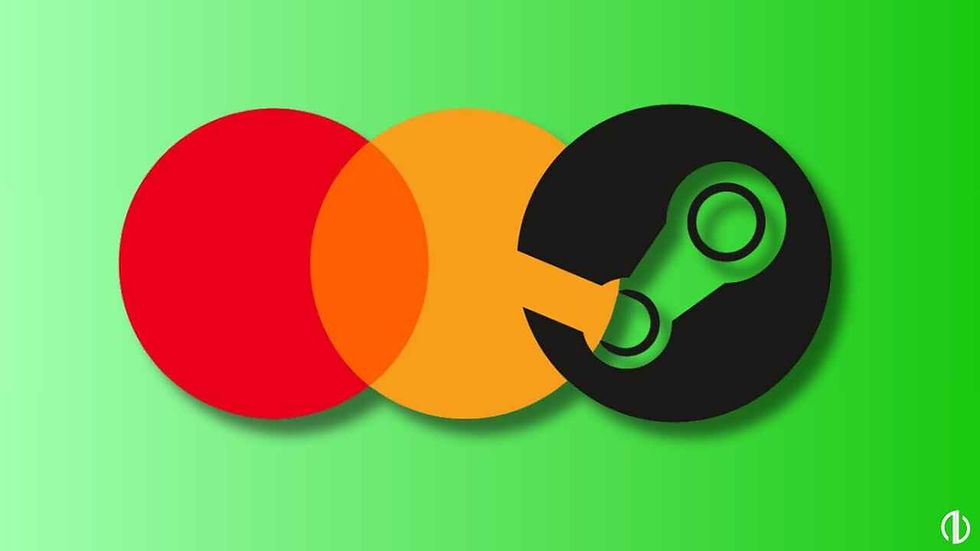Mastercard and Valve Clash Over Adult Game Policies
- Tech Authority

- 5 days ago
- 3 min read
The gaming community has been rocked recently by a controversy that transcends content ratings and consumer choice it plunges headfirst into what some are referring to as "financial censorship." A couple of weeks ago, Steam, a huge digital distribution outlet for PC games, announced that it would be pulling a substantial number of adult-content games from its store. Why? Payment processor and card network compliance issues, Valve says. This action, though, has ignited a furious backlash from game developers and gamers themselves, particularly those operating in the adult gaming sector, who contend that third-party financial players now decide what legal content consumers can see and buy.

Mastercard and Visa in the Eye of the Storm
The limelight was soon on large card networks such as Mastercard and Visa, with the gaming community accusing them of censoring content. Criticists assert that these financial giants are quietly imposing their own moral standards on the internet by compelling platforms to delete content that they find objectionable even if it is completely legal. Mastercard issued a quick public statement in denial of such interference. The company asserted that it does not censor or ban individual games or platforms, but simply asks retailers to block illegal transactions, not legal adult content.
Valve Fires Back, Citing Indirect Pressure and Rule 5.12.7
In spite of Mastercard's public denial, Valve the Steam company refuted the claim. Valve explained that Mastercard never reached out to them in person, and all the issues were passed through a chain of intermediaries including payment processors and partner banks. Valve explained it had clearly stated its own policy of only permitting legally distributable content on the platform, but this was not sufficient to appease the intermediaries.
The root of the problem seems to be Mastercard Rule 5.12.7, a provision that prohibits transactions that are illegal or considered to be detrimental to the brand reputation of the company. This broad interpretation covers content that may be offensive or be deemed not to be serious enough as art. While Mastercard states that this is to defend its brand from damage to reputation, its critics point out that the rule is being used to indirectly censor adult content, even if it is entirely legal.
Stripe Too Validates Constraints on Explicit Material
It isn't Mastercard alone. Payment service provider Stripe too validated that it doesn't enable explicit material, reference limitations placed by its very own banking partners. This further validates that the problem isn't confined to one or two firms but is a part of a broad ecosystem of financial gatekeeping that content producers have to handle. For publishers and developers within the adult gaming category, these policies are becoming a progressively hostile climate where it is a challenge to market or sell legitimate content without risking removal or demonetization.
itch.io and GOG Respond Differently Amid Scandal
Other gaming platforms have been responding in various ways. Indie-centric itch.io, famous for its open policy towards eclectic content, has removed adult games from browse and search functionality quietly, while negotiating with payment processors. The platform has not delisted these games, though, and most remain available if users seek them out. This is indicative of the balancing act that platforms must undertake between creative freedom and profitability.
At the same time, GOG.com, another well-known gaming platform, has decided to act. With the support of a number of adult game developers and publishers, GOG facilitated the release of FreedomToBuy.games campaign, a courageous attempt to safeguard creative and consumer freedoms. As part of the effort, they provided 13 adult games for free for a short 48-hour window, making a clear statement that legal material should not be silently taken down or censored because financial institutions are not comfortable with it.
The Bigger Battle for Freedom of Creativity in Cyberspace
This incident has reignited an ongoing conversation about creative freedom, digital rights, and the role of financial institutions in shaping online content. As more developers find themselves at the mercy of vague guidelines and unaccountable third parties, the need for transparency and regulation in this space becomes more urgent.
It also poses a vital question: Should banks and other financial institutions control what types of art, entertainment, or expression are available to be purchased and traded on the web? Most believe that this type of censorship is worse than government controls because it tends to be invisible, indirect, and uncontestable.
What's in Store for Adult Game Developers?
For the time being, adult game developers are navigating uncertain ground. As Steam restricts content, and financial middlemen such as Stripe and Mastercard impose unforeseen limits, adult gaming distribution's future might be redirected toward self-hosted stores, cryptocurrency-based payments, or other platforms that celebrate open digital liberty.
Until such time, initiatives such as FreedomToBuy.games are not only a protest but an emblem of resistance, reminding users that artistic expression lawful or otherwise should never be restricted by silent censorship mechanisms behind the scenes.














Comments